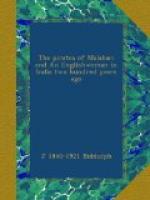The Mahratta Court at Poona had been close observers of the long war waged in the Carnatic between the English and French. They had seen Madras taken, only to be regained by diplomacy, and after the English had been foiled at Pondicherry. They had witnessed the rise of French power under Dupleix; rulers deposed and others set up, in the Deccan and the Carnatic, by French arms; and then, when Mahomed Ali, the rightful ruler of the Carnatic, was at his last gasp, they had seen his cause espoused by the English, and one humiliation after another inflicted on French armies, till at last the French were forced to recognize Mahomed Ali’s title, while a powerful English squadron and a King’s regiment had been sent out to make good the claim. The good relations established between the Peishwa’s government and Bombay by the treaty of 1739, had been strengthened since the arrival of Mr. Richard Bourchier, as Governor, in 1750; the fighting in the Carnatic had raised the military reputation of the English, while their support of Mahomed Ali, whom the Mahrattas styled ‘their master,’ had greatly increased the esteem in which they were held.
When it was definitely known that hostilities between the English and French were at an end, Ramajee Punt, the Sirsoobah of the Concan, was dispatched to Bombay to concert measures against Toolajee. Mr. Bourchier was urged to summon the King’s ships from Madras to co-operate with the Peishwa’s forces.
To await the arrival of Watson’s squadron from Madras would have lost the favourable season before the monsoon, so it was determined to fit out at once what ships were in the harbour, and send them under Commodore William James. Articles of agreement were drawn up, by which it was settled that Severndroog, Anjanvel, and Jyeghur should be attacked by the Mahrattas, while the English engaged to keep the sea, and prevent Toolajee’s fleet from throwing succours into the places attacked. A division of the spoils between the victors was agreed on, by which the English were to receive Bankote and Himmutghur, with five villages, in perpetual sovereignty. The Peishwa’s fleet was to be under James’s orders, and he was instructed to give all the assistance in his power, but not to lend any of his people, except a few to point the guns.
Very little is accurately known of James’s career before his entry into the East India Company’s service. He was born in Pembrokeshire in humble circumstances, and went to sea at an early age. According to one account, he served in Hawke’s ship, but, wherever his training was received, it had made him a first-rate seaman. In 1747, he entered the Company’s marine service, being then about twenty-six years of age.




